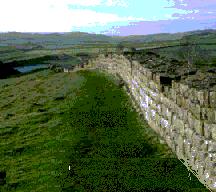 It
is also called Brythonic, and so is named the subgroup of modern Celtic
languages. Anyway, it was the language of those Celts who inhabited England
before Anglo-Saxons came to this island. Celts who settled in Ireland and
further conquered Scotland were the representatives of the other, Goidelic
subgroup.
It
is also called Brythonic, and so is named the subgroup of modern Celtic
languages. Anyway, it was the language of those Celts who inhabited England
before Anglo-Saxons came to this island. Celts who settled in Ireland and
further conquered Scotland were the representatives of the other, Goidelic
subgroup.
Celts invaded the British Isles in the 8th century BC and soon assimilated the aboriginal tribes, obviously non-Indo-European. Nevertheless, many think that pre-Celtic population existed here and much later and influenced Celtic tongues until the beginning of the new AD era, and this influence caused the forming of initial mutations and other peculiarities of Insular Celtic languages.
Brittish people spoke a language which did not go far from Continental Celtic tongues, Gaulish and others, and the way of life was also quite similar, so when Romans came in the 1st century BC they recognized Gauls in Brittons very easily. But as the language was developing, some changes occurred.
Brittish phonetics developed some new vowels from Common Celtic, among which the sound [ü] is the most significant, as it was absent in all other Celtic tongues. Diphthongs tend to disappear here, turning into simple vowels. The Proto-Indo-European *w, which came into Irish f, here is represented mostly by gw, which is seen today in Welsh. It looks like lenitions, nasalisation and other sandhi appeared in Brittish together with Goidelic in the 4th - 7th centuries AD, and from Brittish it went to its heirs: Welsh, Cornish, Breton.
In the 6th century Angles, Saxons and Jutes invaded the island, and after severe struggle Brittons were pushed back to Wales and Cornwall, from where they departed to Brittany, back to the continent. The language broke up to three separate ones, two of them exist nowadays.